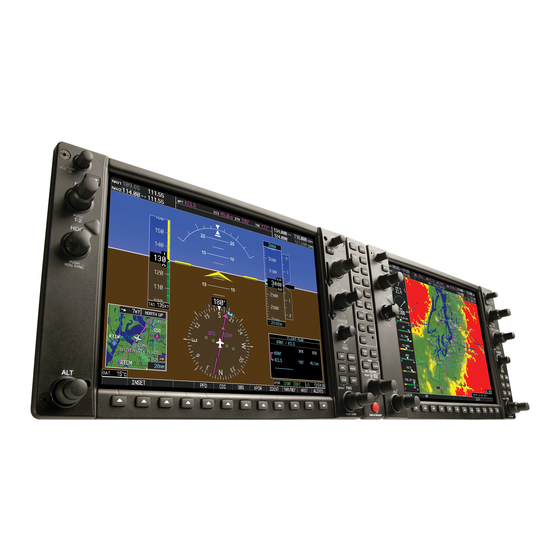SAMPLE SYSTEM OPERATION/FAILURE MODE SCENARIOS FOR FAA-S-8081-4D
AREAS OF OPERATION SECTION IV: RECOMMENDATIONS FOR FAILURE SIMULATION
Cessna does not recommend pulling circuit breakers as a means of simulating failures on the Garmin G1000. Pulling circuit break-
ers—or using them as switches—has the potential to weaken the circuit breaker to a point at which it may not perform its intended
function. Using circuit breakers as switches is also discouraged in Advisory Circulars 120-80, 23-17B, and 43.13-1B. Additionally, a
circuit breaker may be powering other equipment (such as avionics cooling fans) that could affect the safe operation of other equip-
ment.
Failure to Be Simulated
Loss of AHRS and ADC*
(simulates the loss of all primary flight instru-
ments)
Loss of PFD
Loss of MFD
NOTE: * The simulated loss of AHRS and ADC cannot be accomplished individually in the Cessna Nav III aircraft. In this case,
the applicant must simulate navigation on a desired course during en-route or approach operations by using the moving
map display. In order to determine more precisely the horizontal distance from the desired active leg, the applicant or the
examiner may select the cross-track (XTK) data bar field option on the MFD.
AREA OF OPERATION SECTION VII, D: RECOMMENDATIONS FOR FAILURE SIMULATION
According to the PTS, this area only applies both to Task D and unless weather and other circumstances dictate that a precision ap-
proach be used. The table presented on the previous page can be used to create a realistic scenario. As noted in the "Designee Update,
Special Edition on Testing in Technologically Advanced Aircraft" by the AFS-600 (the FAA Regulatory Support Division), appropriate
use of the autopilot should be evaluated either via verbal questioning or, in the case of an AHRS failure, via actual demonstration by
the applicant.
NOTE: The use of the autopilot during an AHRS failure typically limits the autopilot to operation in roll mode.
10
Examiner Action
Press the MENU key on the PFD. AUTO is
highlighted in the PFD DSPL field. If AUTO is
not highlighted, activate the cursor by press-
ing the small FMS knob. Turn the large FMS
knob to move the cursor to the AUTO field.
Turn the small FMS knob, select 'MANUAL'
from the Setup Menu window and press the
ENT key. The cursor moves to the backlight-
ing percentage field. Turn the small FMS
knob counterclockwise; adjust the backlight-
ing value to the lowest value (0.14%).
Press the DISPLAY BACKUP button on the
lower portion of the audio panel. Press the
MENU key on the MFD and use the method
described above to dim the PFD.
Press the DISPLAY BACKUP button on the
lower portion of the audio panel. Press the
MENU key on the MFD. Use the large FMS
knob to move the cursor to the AUTO field ad-
jacent to the MFD DSPL field. Use the proce-
dures above to dim the MFD.
Garmin G1000 Guide for Designated Pilot Examiners & Certified Flight Instructors
(Cessna Nav III)
Applicant Action
Control the aircraft by reference to the backup
attitude, altitude and airspeed indicators;
engage the autopilot in roll mode.
Control the aircraft by reference to the MFD in
reversionary mode (this mode also removes all
moving map presentations).
Control the aircraft by reference to the PFD in
reversionary mode (this mode also removes all
moving map presentations).
190-00368-02 Rev. A

